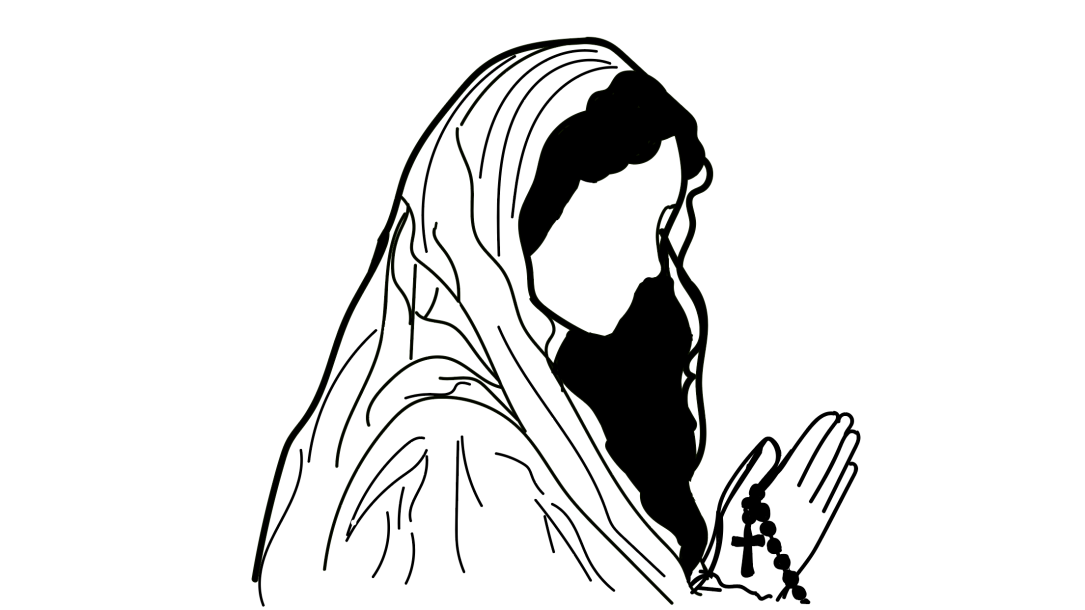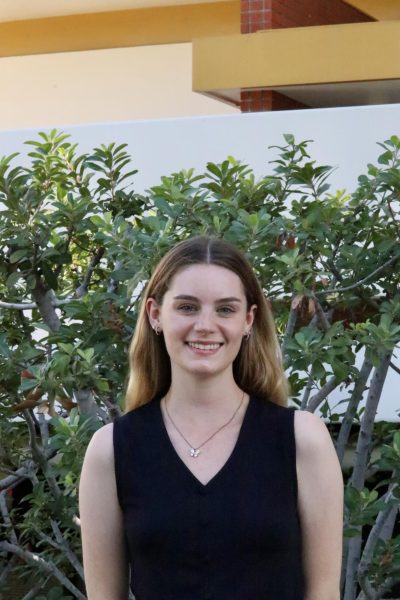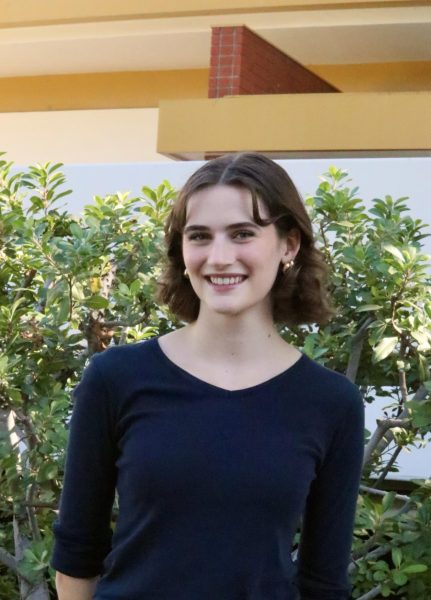As a Roman Catholic student, I’ve felt compelled to bring to light a divisiveness between followers of Jesus from different denominational backgrounds that I’ve sensed on campus. While they are few in number, Roman Catholics among other students from religious denominations like Anglicans, Lutherans and Orthodox still provide a valuable asset to Biola’s community. These students, though different in background and beliefs, are still Christ followers who chose Biola so that they could flourish in a community of other believers.
However, Catholic students feel excluded and unseen in Biola’s community, with very few resources or student groups related to religious minorities at Biola. Additionally, Catholic students have also felt — both directly and indirectly — stigmas, misconceptions and discrimination.
CATHOLIC SPIRITUAL LIFE
Several traditions and practices distinguish Catholic students from other religious groups. Catholics celebrate Mass, a church gathering in which attendees engage in the Eucharist. Additionally, Catholics pray by performing the sign of the cross by touching their forehead, chest, left shoulder, and right shoulder before and after praying (in Orthodox tradition, the pattern of touching the shoulders is reversed). Catholics often pray with the Rosary, a string of beads that they use to guide them through a prayer of asking for intercession from Mother Mary in helping them come closer to her son, Jesus. The Catholic Church also has an established hierarchy, consisting of the people, deacons, priests, bishops, archbishops, cardinals, and the pope.
PERSONAL STORIES FROM STUDENTS
I surveyed students from Catholic and other high-church traditions. The results showed that several of these students felt that there were negative stigmas and misconceptions about their religious identity within the Biola student body.
For Catholic students on campus, Mass is not offered weekly. Though they can pursue it off campus, students far from home or without transportation may find it difficult to find a Catholic community. Not having access to important traditions and practices makes Catholic students feel isolated or disillusioned with their identity.
In addition, Catholic students also feel wary and uncomfortable about practicing their unique religious practices like praying traditional Catholic prayers.
“Growing up Catholic, I feel uncomfortable at least doing the sign of the cross when praying,” said junior Edgar Ortega. “It is how I pay respect to the Lord, and having the feeling [of having] to abandon such practice is a window looking into how I need to compromise myself in regards to this Christian culture.”
Conversely, other religious minorities at Biola, such as Anglicans — a branch of Christianity stemming from the Reformation that roots their practices and beliefs in that of the Church of England — feel more mixed about their inclusion at campus events. While some chapel services make an attempt to extend themselves beyond the practices of the majority of Biola’s students, it may still leave non-Protestant students feeling left out.
“The university utilizes Anglican liturgy in chapel events like Fives, and though it feels almost like appropriation, I have never felt unwelcome here for using terms like ‘priest’ or ‘sacrament’ like I thought I would,” said sophomore Nathan Hollister-Fisch, who identifies as Anglican.
Beyond the inability to partake in church tradition, many Catholic students have experienced direct or indirect discriminatory remarks. Sophomore health sciences major Tyler Jones is one particular student who was raised evangelical and later became Catholic and now has experience on both sides of the issue.
“I am not ignorant of the gap between the average Biola student and the Catholic Church – it’s a gap I’m intimately (and painfully) familiar with,” Jones said. “I wish I could say the Catholic experience at Biola was mostly positive, but sadly, it’s been mostly negative … In my time at Biola, I’ve had people say I’m not Christian, in addition to (typically indirect) accusations of heresy, legalism and corruption on top of pedophilia jokes about priests, and once there was even a threat of physical violence against Catholics in my own dorm (from someone who didn’t know I was a catechumen).”
Director of Pastoral Care and Student-Led Ministries, Chad Miller, said that the Spiritual Development team aims to have all-inclusive chapel services that draw from a variety of denominations and their worship traditions. Though they do not offer the Eucharist, services are not designed to cater only to Protestants.
“I’ve always liked working at Biola because it does not represent a particular denomination. My father-in-law is a trustee at a CCCU institution that is directly affiliated with a denomination. These affiliations can help at times, but Biola’s statement of belief lays out many places that overlap with many denominations at once,” said Miller, “By no means do we feel like we’ve represented all the denominations in our programming, but we seek to nod to many diverse forms of worship and never feel like one expression of worship or tradition is superior to any other. Some might say that Fives and Singspiration exist as two ends of a continuum at Biola, with Fives leaning more toward reflective and liturgical traditions, and Singspiration embodying many of the evangelical traditions and expressions of worship. We always love hearing from students of all kinds of traditions and denominations. Over the years these students have collectively helped us shape our programming into what it is.”
Miller relayed to me how disheartening it is to hear that Catholic students have experienced discrimination in a setting such as Biola. Additionally, the Spiritual Development team intends for the capacious design of chapel services to allow students to experience the traditions of various denominations.
“It’s hard to hear when students don’t experience a sense of welcome… especially in worship settings. This is why I’ve always known Spiritual Development and Chapel Programs to be pursuing diverse forms of worship so that the entire student body collectively has an experience of the legitimacy of traditions that are new or unfamiliar,” Miller said, “We hope that over their time at Biola, all students will be able to look to the front and see themselves reflected in those who are sharing from the front. We’re hopeful that this will continue to help the Biola community understand and even value traditions that are not their own.”
MY PERSONAL EXPERIENCE AS A CATHOLIC STUDENT
When I first chose to come to Biola, I didn’t think twice about being a Catholic student at a Christian school. I knew that I believed in Jesus Christ and the same God, and was certain that I would be accepted by Biola’s Christ-loving community. However, after several interactions, indirect comments and stories from other Catholic students, I learned that this was not the case.
I come from a Catholic family that has been Catholic for generations. I even have a relative in Italy who is a Nun, serving as the principal of a Catholic school. I grew up attending Mass at a Catholic church, doing the sign of the cross when I prayed and was taught that I could pray with Mother Mary and the Saints for intercession with our God. I’ve had Christian friends from a multitude of denominational backgrounds, and I’ve always been able to have conversations about Scripture and God with my Christian friends at youth groups or otherwise; I never felt that there was major discordance or distance between us spiritually.
As I got older, I became much more aware of some of the stigmas and misconceptions surrounding the Catholic faith. As a Catholic, I know that we do not worship Mary and the Saints. Rather than praying to them, we pray with them, asking them to aid us with intercession when communicating with God. We do not idolize or worship them and know that God is above all.
At Biola, I expected there to be much more acceptance and kindness towards my faith than there actually was. I soon became too shy and uncomfortable to do the sign of the cross while praying. I never mentioned the Saints, nor did I bring my rosary on campus. I feared judgment and spiritual ostracization from my fellow Biolans and often had to stay quiet when I heard hateful or discriminatory comments. Additionally, I have always felt a sense of emptiness from not being able to partake in Mass and the Eucharist on campus.
While these incidents may be unbeknownst to some, it has become apparent through my experience that there are students who harbor misconceptions and stigmas about the Catholic faith. As a result, myself and other Catholics wonder what people would think if we were more open about our Catholic faith. This leaves me thinking that Biola’s student body may need to begin making a proactive effort to love and understand the various traditions and practices of other Christ believers. Unfortunately, my own experience and that of other Catholics reflect that we simply aren’t there yet.
HOW CAN WE BE BETTER?
As followers of Christ, it seems contradictory that certain religious denominations, who also believe in the love of God and his Son, should be stigmatized or discriminated against. These hurtful or misleading comments seem to bring a harsh divisiveness to campus that is driving Catholic students and other religious minorities away.
There is a need to have profound and open conversations with one another, in which students of all backgrounds can share their practices and traditions without fear of judgment.
“There are language and cultural barriers that often get in the way of fruitful dialogue. It doesn’t help that it’s a conversation that deeply deals with a person’s identity as either Protestant or Catholic, so the defenses are always up,” said Jones. “The evangelical says we’re saved ‘by faith through grace,’ and the Catholic hears ‘a sacramental life of virtue.’ Grace-enabled faith and a sacrament-enabled imitation of Christ are seen as synonymous to the Catholic, even if they can’t articulate it as such, while many evangelical students balk at the word sacrament, let alone virtue. Isn’t it all about a personal relationship with Jesus?”
If we are to truly love our neighbor and practice the love and grace that God’s Son has shown to us, then it seems vital that we should cultivate a level of self-awareness that allows us to see the biases and stigmas that are preventing us from being one with Christ. The harsh divisiveness between Catholics and Christians on Biola’s campus, which has brought a great deal of personal and spiritual turmoil both to myself and others, is not a practice that reflects the grace of Our God.
Hopefully, Biola’s student body can begin making efforts to close the gap between Catholic and Christian students on campus — whether it’s by clearing up misconceptions or opening up a genuine conversation.
This can bring us one step closer to true unification on campus and allow us to show love towards our neighbor, just as we’ve been commanded in John 13:34: “A new command I give you: Love one another. As I have loved you, so you must love one another.”







